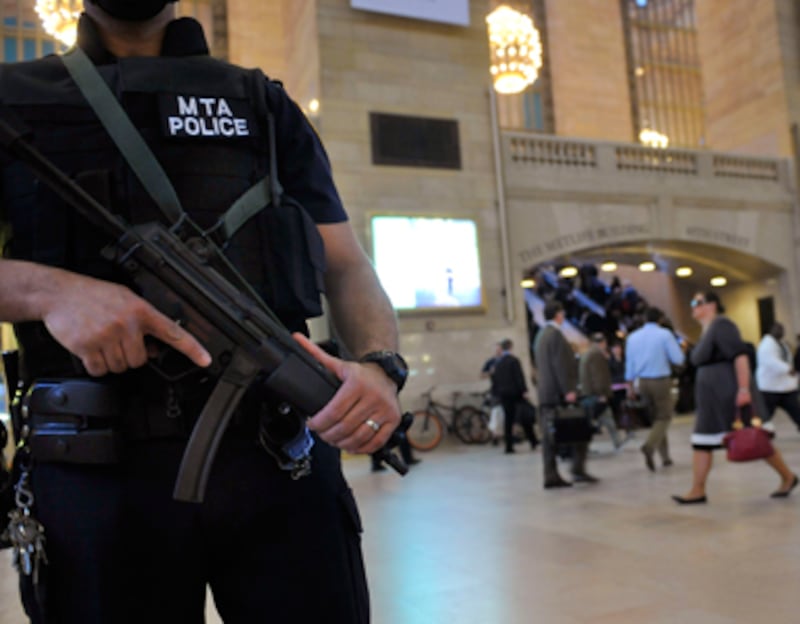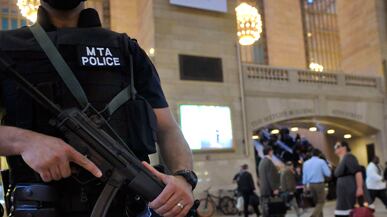On Thursday, the Department of Homeland Security issued a warning suggesting al Qaeda had contemplated attacks on U.S. railroads. Christopher Dickey on why bin Laden's death won't protect us from attacks—and the new breed of small scale, random terror threats that may be coming next. Plus, full coverage of bin Laden.
Holed up year after year in the dark bedroom of his dreary villa in Pakistan, Osama bin Laden thought a lot about symbols. They had always been central to his strategies for terror. He hit the World Trade Center and the Pentagon in September 2011 mainly because they were icons of U.S. power. In 2002, al Qaeda plotted to bring down the Brooklyn Bridge.

But the American commandos who terminated bin Laden on Sunday brought out bits of intelligence that suggest he may have been lowering his sights. On Thursday the Department of Homeland Security issued “ an intelligence message” about “potential al Qaeda contemplation of plots against the U.S. rail sector.” Even if Osama had blown up a train, or derailed it, that’s hardly a new 9/11.
The good news here: it shows how effectively intelligence and law enforcement have prevented new attacks against big targets. The bad news: it’s much, much harder to defend against random hits with no great symbolic significance. In the past, the apocalyptic ambitions of bin Laden and his Egyptian ideologue, Ayman Zawahri, may even have helped protect Americans. Zawahri, who is still at large, reportedly vetoed a plot to release cyanide gas in the New York subway in 2003 because it wasn’t sufficiently spectacular.
On Thursday, when President Barack Obama’s whole motorcade pulled onto the sidewalk of the NYPD’s First Precinct station so he could pay his respects there before he went to ground zero, he signed into the command log and wrote “God bless.” He shook hands with dozens of cops and told them, “What we did on Sunday was directly connected to what you do every single day.” But he didn’t need to remind them that from the Statue of Liberty to Wall Street, from the United Nations to the great hotels, their town remains the most densely populated and most target-rich environment for murderous lunatics from all over the world. “When you catch a terrorist and you look at the map in his or her pocket, it is always a map of New York,” as Mayor Michael Bloomberg has said many times.
The increase in the city’s visible security measures since Obama offed Osama has been dramatic. Shifts are extended so the cops can give extra coverage to the subway system, landmarks, places of worship, and other possible targets. Police helicopters with ultra-high-tech surveillance equipment have stepped up their focus on bridges and tunnels. “Not because of any specific information,” says NYPD Deputy Commissioner for Public Information Paul Browne, “but just to take the precaution in case bin Laden’s death might inspire some sort of attack.”
Zawahri reportedly vetoed a plot to release cyanide gas in the New York subway in 2003 because it wasn’t sufficiently spectacular.
What’s left of al Qaeda is trying to do just that. A statement circulating on jihadist forums Friday confirmed bin Laden’s death, then went on to threaten vengeance, calling his killing a “curse that chases the Americans and their agents, and goes after them inside and outside their countries.”
As for the threat against rail traffic in the United States, that’s a problem the NYPD anticipated years ago, with an attempt to derail trains on the New York-Washington route seen as a special problem. In 2005 New York Police Commissioner Ray Kelly organized a Northeast Rail Coalition to help coordinate police forces that worked on that corridor.
Over the long term, the fight against terrorism has to be intelligence-driven and preemptive, which is the focus of the multi-agency Joint Terrorism Task Force, led by the FBI, and the NYPD’s own counterterror operations that work out of secret locations in Brooklyn and Manhattan.
Unfortunately, those who follow the terrorist threat most closely don’t think bin Laden’s death will have reduced it much, if at all. “It’s good that we got him,” a senior law enforcement official told me the morning the news broke. “Until we did this, we appeared weak and anemic. But when it comes to terrorism, I don’t think it makes a difference whether he’s alive or not. He wasn’t responsible for Marrakesh. He wasn’t responsible for the guys picked up in Germany on Friday,” the official said, referring to the bombing at a favorite tourist destination in Morocco that killed 16 people last week and the arrest of three men in Germany for allegedly plotting to bomb targets there.
Whatever plans bin Laden laid in his Pakistani bedroom, so many al Qaeda sub-groups have sprung up with vicious and ambitious leaders out to prove that they can kill Westerners, too, that the man to whom many supposedly pledged allegiance in fact exercised little or no control over them. The wannabe bin Ladens have already shown they’ll take any shot they can get. They’ve even claimed credit for close calls that failed. As Robert Fisk wrote earlier this week in The Independent, the al Qaeda “movement has no ‘leadership’ as such, bin Laden being the founder rather than the boss.” In the end, he had become no more nor less than a symbol himself.
“Those inspired by bin Laden,” says the senior law enforcement official, “don’t see a difference between where he is now”—a corpse reportedly buried at sea—“and where he was a few days ago” hidden away from the world in Pakistan.
Christopher Dickey is the Paris bureau chief and Middle East editor for Newsweek Magazine and The Daily Beast. He is the author of six books, including Summer of Deliverance, and most recently Securing the City: Inside America's Best Counterterror Force—the NYPD.





